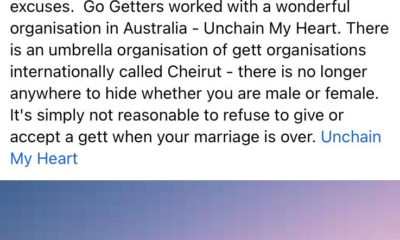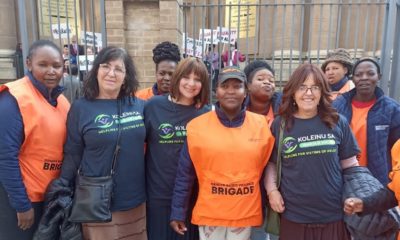
Community

Time to confront the elephant in the community
Do we have gett refusers in our community? You may think not, but unfortunately we do.
Rebbetzin Kayla Goldstein from New Jersey, the founder of the international rabbinic vaad (council) against gett refusal, spoke last week about how gett refusal is a form of abuse which can thrive only when a community fails to sanction gett refusers. She believes the only way to eliminate this and all other forms of abuse is for the entire community, from the top down, to have a zero-tolerance policy, to be a community that simply doesn’t tolerate abuse. This sounds easy, but what does no tolerance look like?
The truth is that we all fall foul of this in some way. There are emotional reasons why we fail to take action. We may not want to lose favour with the accused or be seen as impolite. We may not want to believe bad things about this person. We’re unwilling to confront the unpleasant elephant in the community. We pride ourselves on being people who give others the benefit of the doubt, who are kind and caring, and who believe in the power of repentance. The danger of this is that we push things away, pretending that they don’t exist and ignoring the red flags. This is especially true when the alleged abuser is a friend or a colleague of ours. The real hard truth is that we just want to avoid being part of something unpleasant. We famously say, “I don’t want to get involved”, or “Let the professionals or police or anyone else deal with it.” Another argument often used to justify failure to take action is to ask, “If this was true, surely the rabbis or community leaders would have dealt with it?”
This lack of support for the victim is agonising, and paves the way for the abuse to continue. By being polite, not saying anything, allowing the alleged abuser into our communal places, we’re subliminally communicating that their behaviour is acceptable and they can continue as normal. Simultaneously, we’re saying to victims that we don’t stand behind them, don’t believe them, and don’t care. We have failed to stand up for those who need it most, and this endangers our community.
So what does standing up for victims look like?
First, we need to challenge our mental block of “I’m not getting involved.” With this block, no intervention can take place;
Second, we need to dig deep and find the courage to get involved by speaking out and reporting;
Third, once people are ready to act, they may be unsure about what to do to help. In these situations, one should turn to a relevant authority who can take action; and
Fourth, if an instruction is given to the community about an alleged offender, it needs to be strictly upheld.
Rebbetzin Goldstein shed light on how important it is for people to understand the Beth Din process when dealing with abuse. In order to manage a case which has been brought to its attention, the Beth Din should have a clearly specified process which the community is made aware of – in any case of abuse. This needs to include a specially trained body of rabbis, and professionals such as psychologists, social workers, lawyers, and child-protection specialists where necessary. The process should comprise a full investigation of the matter; an assessment by a panel of professionals; deliberations; and finally a decision as to the way forward. That may take the form of a directive given about the offender either to community rabbis alone, or to the wider community. This directive must be upheld by every rabbi, communal leader, shul member, and community member. If a single rabbi refuses to follow the Beth Din’s directive, its power to sanction the offender is weakened and the message sent to offenders is that they are safe in our community. They won’t be held to account. To the contrary, they will be sheltered and protected, even at times honoured.
Once a directive has been issued, for example that the person is not allowed entry into any of the shuls, members of the community or friends of the individual could then approach this person and pressurise them to conform to this ruling on the basis that as a member of our community who receives the benefits of that community, they are duty bound to adhere to its internal rules and practices. For example, there could be social consequences, telling them that unless they conform with what they are being instructed to do, they will no longer form part of our social circle. This sends a clear message that abuse of any kind brings about strong action in our community.
We’re one nation, one community, one body, and with that comes the duty and privilege of being uncomfortable when it’s called for.
- Rebbetzin Wendy Hendler is the co-founder and director of Koleinu SA, the helpline for victims of abuse in the South African Jewish community. The helpline number is 011 264 0341, operating Sunday to Thursday, from 09:00 to 22:00, and after Shabbat until midnight.










